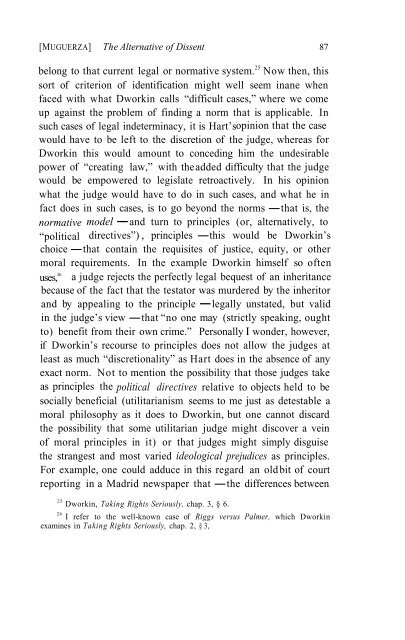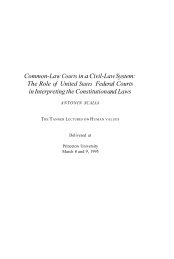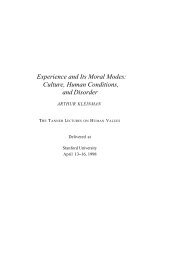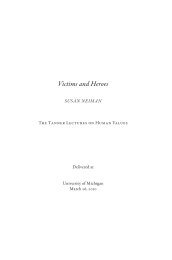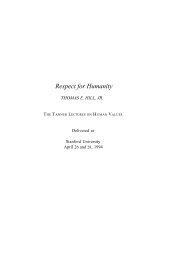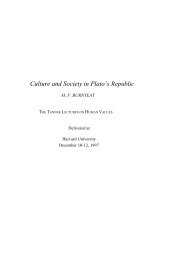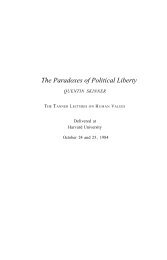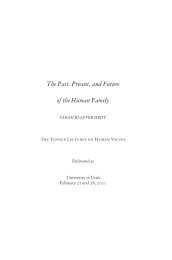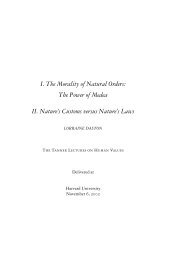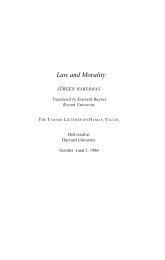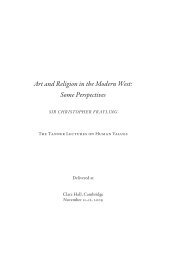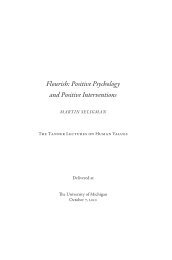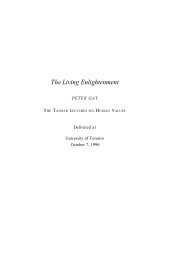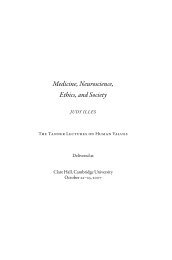Muguerza, Javier - The Tanner Lectures on Human Values
Muguerza, Javier - The Tanner Lectures on Human Values
Muguerza, Javier - The Tanner Lectures on Human Values
You also want an ePaper? Increase the reach of your titles
YUMPU automatically turns print PDFs into web optimized ePapers that Google loves.
[MUGUERZA] <str<strong>on</strong>g>The</str<strong>on</strong>g> Alternative of Dissent 87bel<strong>on</strong>g to that current legal or normative system. 25 Now then, thissort of criteri<strong>on</strong> of identificati<strong>on</strong> might well seem inane whenfaced with what Dworkin calls “difficult cases,” where we comeup against the problem of finding a norm that is applicable. Insuch cases of legal indeterminacy, it is Hart’s opini<strong>on</strong> that the casewould have to be left to the discreti<strong>on</strong> of the judge, whereas forDworkin this would amount to c<strong>on</strong>ceding him the undesirablepower of “creating law,” with the added difficulty that the judgewould be empowered to legislate retroactively. In his opini<strong>on</strong>what the judge would have to do in such cases, and what he infact does in such cases, is to go bey<strong>on</strong>d the norms - that is, thenormative model - and turn to principles (or, alternatively, to“political directives”) , principles - this would be Dworkin’schoice - that c<strong>on</strong>tain the requisites of justice, equity, or othermoral requirements. In the example Dworkin himself so oftenuses, 26a judge rejects the perfectly legal bequest of an inheritancebecause of the fact that the testator was murdered by the inheritorand by appealing to the principle - legally unstated, but validin the judge’s view - that “no <strong>on</strong>e may (strictly speaking, oughtto) benefit from their own crime.” Pers<strong>on</strong>ally I w<strong>on</strong>der, however,if Dworkin’s recourse to principles does not allow the judges atleast as much “discreti<strong>on</strong>ality” as Hart does in the absence of anyexact norm. Not to menti<strong>on</strong> the possibility that those judges takeas principles the political directives relative to objects held to besocially beneficial (utilitarianism seems to me just as detestable amoral philosophy as it does to Dworkin, but <strong>on</strong>e cannot discardthe possibility that some utilitarian judge might discover a veinof moral principles in it) or that judges might simply disguisethe strangest and most varied ideological prejudices as principles.For example, <strong>on</strong>e could adduce in this regard an old bit of courtreporting in a Madrid newspaper that - the differences between25 Dworkin, Taking Rights Seriously, chap. 3, § 6.26 I refer to the well-known case of Riggs versus Palmer, which Dworkinexamines in Taking Rights Seriously, chap. 2, § 3,


